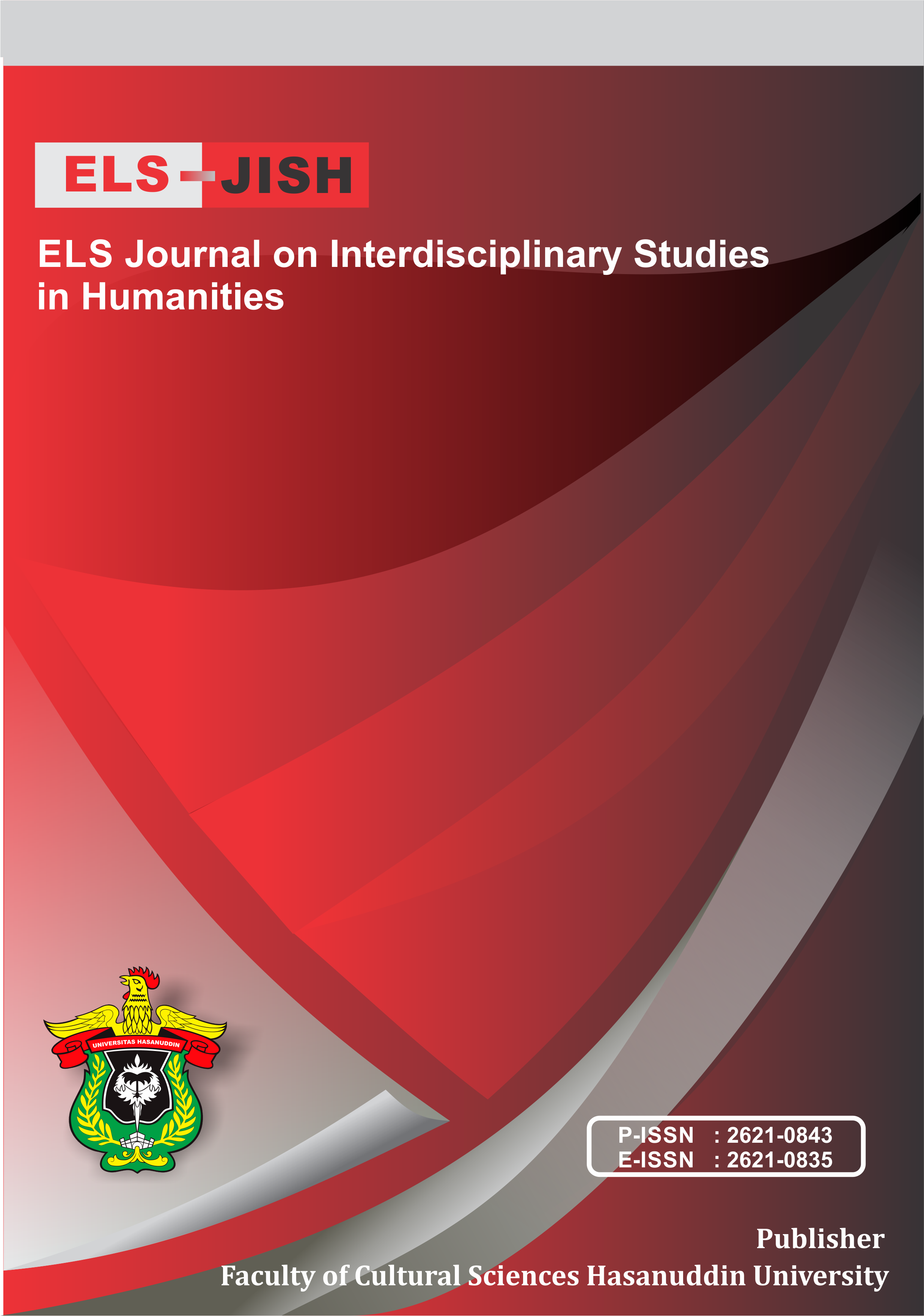Politeness Strategy in Commissive Speech Acts
DOI:
https://doi.org/10.34050/elsjish.v4i2.11823Keywords:
Commissive Speech Acts, Politeness Strategy, Speech Variety, Verbal CommunicationAbstract
Understanding comissive speech acts is important in oral or written communication because humans are often facing problems in communicating using language. So, someone can take action under the meaning, intention, and purpose of their utterance. In every speech act, not only the context, but also the utterance cannot be separated from the use of verbal utterance. This study specifically aims to describe and explain about politeness in commissive speech acts in a variety of speech situations. The research method used is the descriptive analysis method. The data in this study are the form of utterances contain in the conversation of film. The results of this study are founds 4 (four) types of commissive speech acts, they are: promise, swear, pledge (berniat), and vow (bernadar). While the politeness strategies in commissive speech acts include: (i) Cost-Benefit Scale found in promise, (ii) Optionally Scale in swear and pledge, (iii) Indirectness Scale found in promise, swear, and vow, (iv) Authority Scale found in swear that, (v) Social Distance Scale found in pledge.Downloads
References
Austin, J.L. (1962). How to Do Things with Words. Oxford: Oxford University Press.
Aziz, E. Aminudin. (2003). Usia dan Realisasi Kesantunan Berbahasa: Sebuah Studi Pragmatik pada Para Penutur Bahasa Indonesia. Dipublikasikan dalam PELBBA 16 (Kumpulan Makalah Pertemuan Linguistik Pusat Kajian Bahasa Atma Jaya: Keenam Belas). Jakarta: Yayasan Obor Indonesia.
Bachriani, B., Yassi, A. H., & Rahman, F. (2018). A Comparative Study of Euphemism in English and Buginese: Pragmatic Stylistics Contexts. ELS Journal on Interdisciplinary Studies in Humanities, 1(4), 429-440.
Barron, A. (2003). Acquisition in Interlanguage Pragmatics. Amsterdam: John Benjamins Publishing.
Brown, Penelope and Stephen C Levinson. (2008). Politeness Some Universals in Language Use. Great Britain: Cambridge University Press.
Chaer, Abdul dan Leonie Agustina. (2004). Sosiolinguistik: Perkenalan Awal. Jakarta: PT. Rineka Cipta.
Cummings, Louise. (1999). Pragmatik: Sebuah Perspektif Multidisipliner (Terjemahan: Abdul Syukur Ibrahim). New York: Oxford University Press.
Egner, I. (2012). The Speech Act of Promising in an Intercultural Perspective. SIL International.
Grundy, Peter. (2000). Doing Pragmatics. New York: Oxford University Press.
Ismari. (1995). Tentang Percakapan. Surabaya: Airlangga University Press.
Jeon, et al. The Conditions of Making Promises Journal. Kridalaksana, Harimurti. (1985). Fungsi Bahasa dan Sikap Bahasa. Flores: Nusa Indah.
Kuntjara, Esther. (2003). Gender, Bahasa, dan Kekuasaan. Jakarta: PT BPK Gunung Mulia Jakarta dan UK Petra Surabaya.
Leech, Geoffrey. (1993). Prinsip-prinsip Pragmatik. (Terjemahan M.D.D.Oka). Universitas Indonesia: Jakarta.
Muhadjir, Noeng. (1990). Metodologi Penelitian Kualitatif. Yogyakarta: Rake Sarasin.
Mulyana, Deddy. (2016). Ilmu Komunikasi: Suatu Pengantar. Bandung: PT. Remaja Rosdakarya.
Paina. (2010). Tindak Tutur Komisif Bahasa Jawa: Kajian Sosiopragmatik. DISERTASI. Program Pascasarjana Fakultas Ilmu Budaya, Universitas Gadjah Mada Yogyakarta.
Rahman, F. (2019, February). Save the world versus man-made disaster: A cultural perspective. In IOP Conference Series: Earth and Environmental Science (Vol. 235, No. 1, p. 012071). IOP Publishing.
Searle, R. J. (1969). Speech Act: An Essay in the Philosophy of Language. Cambridge: Cambridge University Press.
Searle, R. J. (1975). Indirect Speech Acts. In P. Cole and J. Morgan (Eds.), Syntax and Semantics, vol. 3: Speech Acts (pp. 59–82). New York.
Searle, R. J. (1981). Expression and Meaning: Studies in the Theory of Speech Acts. USA: Cambridge University Press.
Suherman, L. A. (2018). The Analysis of Metaphorical Domain on English “Stab Verb” in Corpora. ELS Journal on Interdisciplinary Studies in Humanities, 1(1), 52-58.
Watts, R. J., S. Ide & K. Ehlich (Eds.).(1992). Politeness in Language. Berlin: Mouton de Gruyter.
Yule, George. (1996). Pragmatics. Hongkong: Oxford University Press.
Downloads
Published
Versions
- 2022-06-29 (2)
- 2021-06-22 (1)
How to Cite
Issue
Section
License
Copyright (c) 2021 Devi Mulatsih Mudiharjo, Tajudin Nur, Lia Maulia Indrayani, Nani Darmayanti

This work is licensed under a Creative Commons Attribution-NonCommercial-ShareAlike 4.0 International License.

















